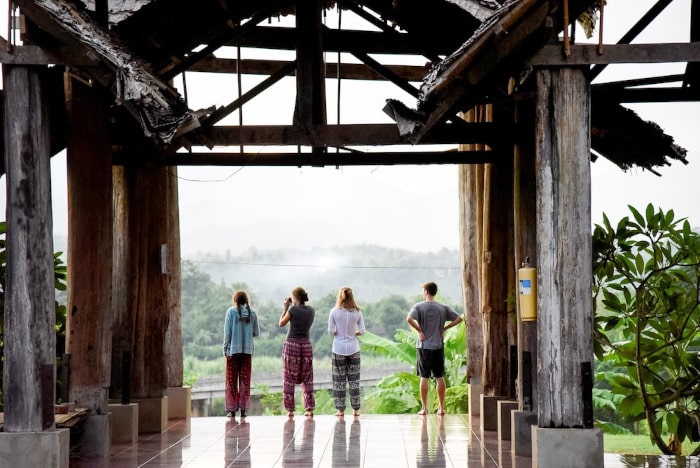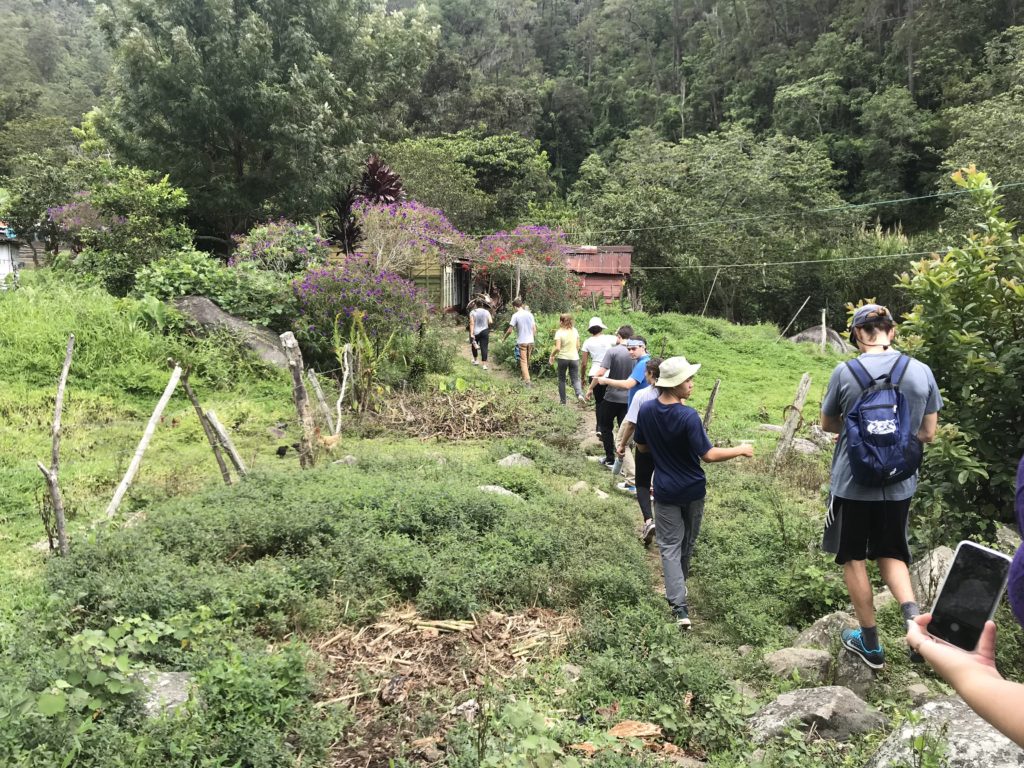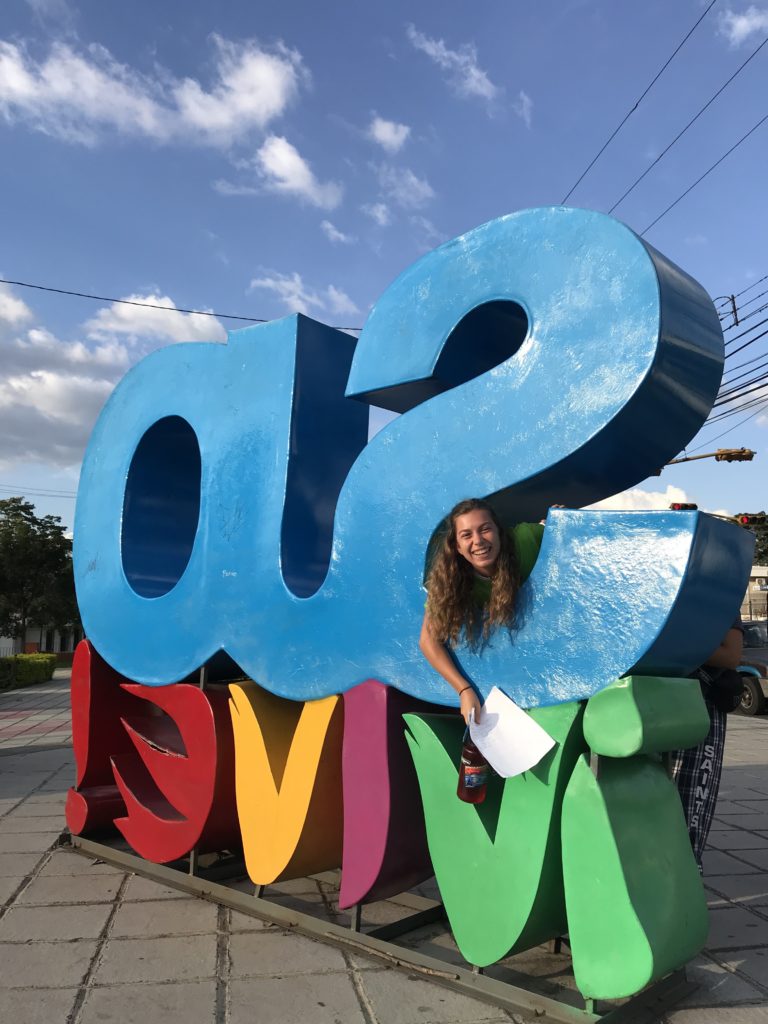College is an amazing opportunity. It’s the one time in life when your community is made up completely of peers your own age (except for maybe assisted living, but that’s less fun). Your campus is designed solely for your personal betterment. You have access to advisors, coaches, cooks, cleaners, landscapers, and of course educators. Your campus has built in activities: sports, concerts, clubs, guest comedians, hypnotists, and speakers.
College gives you everything, except the time and preparation to fully take advantage of its resources.
Many college graduates admit that they didn’t have perspective during their college years. Most college students don’t get the chance to. Graduation rates are so low, colleges have started measuring “success” by their six-year graduation rate for a four-year degree. Here are five reasons students come up short, and why studying abroad before college is better.
1) Orientation
One of the main concerns we hear about from prospective Verto families is, “I don’t want to miss out on the traditional freshman college experience.” This is totally understandable. The importance of traditional college has been drilled into all of us from birth. We’re supposed to have our Animal House moment, our end-of-day recaps with our freshman roommate, and our stimulating conversations with our tweed jacketed professors. Freshman orientation fosters community and school spirit. Coming in a semester or two “late” is cause for concern that the students who arrived on campus on a traditional path have a head start on relationship building, campus familiarity, and the intricacies that make University of X so unique.
It’s easy to idealize the first week of college. In reality, most freshman orientations last about 48 hours, and are more focused on how to use the laundry machines and meal plans, and how to avoid getting MRSA from the communal showers.
The Verto Difference:
Verto’s orientation starts long before the college semester. Our participants and parents attend video calls throughout the summer, joined by other participants, their families, and our staff. It’s a chance to see the people they will be traveling with, a chance to defuse nerves, and a chance to learn more about the experiences ahead of them. We cover coursework, travel itineraries, expectations, safety, and how their semesters abroad will set them up for successful, meaningful college careers.
Then comes arrival day. Participants arrive in country around the same time, are picked up by the on-sight location team, and then we reach our campuses and study centers for orientation. This orientation is the mother of all orientations. It’s a chance to let the dust settle, acknowledge that high school is over, and understand that you are on to something big. Our students discuss why they are in college, and what they are hoping to get out of this experience. This serves two purposes:
- It’s important to know why you’re going to college. It takes four years, it’s expensive, and it’s an amazing opportunity that when done right, will set you up for a life full of meaning.
- Understanding your “why” will allow our faculty and staff to better serve you. In-country orientation helps students balance the gravity of college with the fun opportunity it is to soak up as much as possible.
Throughout the week, we go from safety discussions to exciting bonding activities like tea-parties in London, white water rafting in Costa Rica, or a traditional kipaepae ceremony in Hawaii. Participants gain a deeper understanding of what they want out of the college experience, and open their eyes to parts of the world they’ve never seen before.
2) Community
Many students get this sense that they’ll arrive on campus and immediately make friends with the people who will be in their wedding party years later. What students don’t realize, it that there’s an equal chance that your freshman roommate will be a shut-in who hasn’t quite mastered the art of showering. The weight we put on freshman social life is ridiculous. For many, this is the first time away from home, they’re surrounded by strangers, and oh yeah they’re supposed to get good grades because this experiment is costing tons per year. Many students show up on campus unable to focus, and the community they build reflects that. They dive into what they think college is supposed to be, and riff raff ensues. Some pull it off, while many don’t find their lifelong friends until sophomore, junior, or even senior year. I didn’t even have a real conversation with my freshman roommate until the night before winter break!
The Verto Difference:
Participants on semesters abroad are part of communities with their fellow students, professors and program leaders. You will be with your peers for classes, housing, and excursions, meaning there’s tons of time to see the same faces in invigorating settings and get to know each other deeply. Students bond over travel serendipities, amazing people they meet, unique food, and unconventional classrooms. Community is built in.
The Verto community is also a self-selecting one. We may be biased, but you have to be a pretty open minded, cool person to want to travel for freshman year.
Students who attend a Verto partner college will arrive on campus with other students who understand the experiences they’ve had. We also work closely with our partner colleges to ensure that our students receive a thorough on-campus orientation. They are introduced to campus clubs, events, activities, and teams. They are also integrated with the international student population, transfer student population, and any other students who came to campus on a unique path. Students arrive on campus as either 2nd semester freshmen or as sophomores, often with a stronger sense of community than students who matriculated through the traditional path.
As one of our families recently put it, traveling on a semester or year is a great way to let your peers grow up so that when you arrive on campus, they’re on your level.
3) Academic support
A lot of college students make it through all four years without taking advantage of – or even knowing about – the resources available to them on campus. If students use their professors’ office hours, it typically isn’t until midterms or final exams when grades are in trouble. The academic support office is surrounded by stigma, and the career services office is often some annex in the corner of campus. Some do it very well (see this and this and this), but college is too often seen as an individual’s accomplishment, rather than a community effort.
The Verto Difference:
Our participants’ academic input doesn’t just come from internal drive, but from community encouragement. Participants enjoy excursions and extra-curricular activities along with their professors. Students get more contact hours with professors on a semester abroad than they ever will on a traditional campus. If you’re still excited about something you learned during the day, you could have dinner with your professor that night. Keep talking about it! If you’re having a hard time with a topic, ask them about it! Verto’s model provides a unique opportunity to spend informal, occasionally unstructured time with the experts. There is no student : professor divide. No intimidation. One-on-one mentorship is a daily occurrence on a semester. Students have Academic Success Coaches who are personally invested in their success. Our alumni arrive on campus with the understanding that faculty are an amazing resource, and of course students are supposed to build those relationships!
In regards to peer academic support, group projects are not the type where students can sit back and let the “Type A” student do all of the work. This is not a lego robot or a recitation of The Once and Future King. Projects have a clear, measurable impact and real life applications, that students can see in real time during their excursions and travels. They have purpose and meaning, and our community of students rally around each other to encourage success.
4) Academic focus
The academic concern is twofold. Parents want to make sure that their child is academically challenged enough to prepare them for college, and to make sure that students are academically on track to graduate in four years.
Too often, students and parents conflate academic rigor with hours of mandatory readings and twenty page papers. The rigors of freshman year usually include getting to your 8am class on time, and staying awake for the 200 person English 101 lecture hall. Ask most people what they learned in their freshman year of college and you aren’t likely to hear much about the college curriculum.
When it comes to staying on track to graduate in four years, the reason that most students end up staying in college for five years or more is because they end up switching majors halfway through. Millions of students are in the classroom every year from age five to twenty-three. Students are expected to go into college knowing exactly what they want to do. They often aren’t given the space to ask why, or to figure out their goals aside from answering the question, “What do I want to be when I grow up?” I failed at that question until my late twenties. For that reason, nearly a third of students change their major at least once within three years.
The Verto Difference:
Ask a student what they learned their freshman year and they will be able to recall learning about public health by visiting aqueducts that bring fresh water to a local community, studying anthropology through the lens of the indigenous Bribri culture in Costa Rica, and learning Spanish by living in local homestays playing late night cards with their host families. General education course are exactly what they should be, an exciting foundation to the rest of a student’s college career. Writing a 10 page paper and doing readings gets a whole lot easier when students are invested in what they are learning because they are implementing it every day.
Staying on track to graduate is also not a problem for students studying abroad with us. Our credits map seamlessly to general education courses which means they aren’t behind when they arrive on campus. Students are also studying each of these subjects in real-world settings, experiencing first hand what a career in each of these fields would look like. Not only can students save themselves four years of the wrong major, but they may be saving themselves 20+ years of the wrong career.
5) Tuition
College tuition is getting out of hand. By 2030, the average public school’s four-year degree will cost more than $205,000. Colleges are finding that in order to survive, they have to keep up with the Joneses. When the Joneses hike their tuition to build a new library or gym every two years and offer professors tenure, tuition-paying students suffer. This topic deserves its own article, but we’ll leave it here: traditional college is expensive.
The Verto Difference:
Every student should have a chance to travel the world, and no student should let college debt inhibit that opportunity. Verto was designed to give participants the opportunity to see new countries while graduating in four years at the same cost, if not less, than your typical semester of college. We’ve designed an experience where traveling actually saves you money.
How do we do it? By partnering with a world-class Academic Provider and eliminating anything that does not directly contribute to your educational experience. That means you don’t have to pay any dues for sports teams you’re not on, groundskeeping, or that new wing on the department you don’t study. Lower overhead allows us to provide a high quality experiences for way less. In addition to lower costs, like any college, Verto allows use of private loans (Use Sparrow, a trusted portal, to research and compare your loan options), grants, and scholarships. There were plenty of travel options out there before Verto. We started Verto to increase equity, access, and inclusion in higher education.
College is a time of exploration. Why explore a mile radius campus when we have access to 196.9 million square miles?




